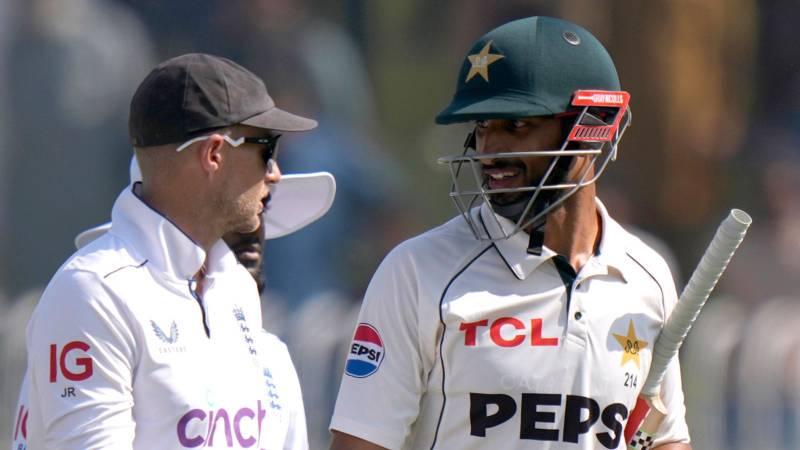
Finally, the Pakistan national cricket team has returned to winning ways. The simple fact that they have engineered one of the greatest comebacks in the history of Test cricket on the backs of efforts by some gentlemen who were discovered, harnessed, and turned into battle-hardened cricketers at the domestic level has redoubled the joie de vivre within my soul.
Till last week, I felt like a parched traveller who searched high and low for a drop of water for three years and eight months and agonisingly went unrewarded. But suddenly, I found a blue lake to bathe in and drink my fill, imagine my delight.
Today, I finally feel my thirst quenched after an eternity of dryness and famine in the desolate wilderness vis-à-vis the series victory against the English at home.
This completely dry period of almost four years of winning a morsel, let alone a Test match at home, has finally come to an end; hence, it is little wonder that the nation is rejoicing.
I had almost given up on Pakistan cricket, but the boys from Pakistan's domestic cricketing circuit converted us back to being cricket's tragic-lovers and poets acting delirious in our euphoria.
What makes me superlatively happy is the fact this time, it wasn't the fancied superstars such as the Babar Azams, Shaheen Shah Afridis or Naseem Shahs; it was the otherwise relatively unknown domestic toilers such as Saud Shakeel, Salman Agha, Sajjid Khan and Noman Ali who showed grit, determination, prowess and skill to not only defeat the 'Bazzball' brigade but also left English captain Ben Stokes speechless.
Having been deeply involved in commentating on domestic cricket, I have witnessed first-hand the evolution of players like Saud Shakeel, Salman Agha, Noman Ali, Sajjid Khan, and many others, who have been a part of the national team /squad, performed for Pakistan, and made a difference.
The players mentioned above are all products of the premier domestic cricketing tournament, the Quaid-e-Azam Trophy. Yet, some nincompoops in our haphazard cricketing structure continue to devalue the importance of four-day cricket.
While I agree that we must revamp that tournament, it has undisputedly delivered the goods even in its current defunct state.
Today is a remarkable day for Pakistan cricket and the men who have toiled under the punishing sun in our domestic cricketing system have delivered the goods; not only have they infused a new life into Pakistan cricket but also in the smoke-filled lungs of this beleaguered nation
You can improve the Quaid-e-Azam Trophy's financial model, pitches, the cricket ball, and the facilities, but don't undermine the institution itself. It should revert to the system of the six teams, or perhaps the number of teams could be increased to ten, but the importance of a regional cricket system is beyond doubt having produced players like Sajjid Khan and Noman Ali, who twice picked up 20 wickets against a top side like England, to win you a Test series and directly entered cricketing folklore considering the drought and gloom that had been surrounding Pakistan cricket.
I believe the Shaheens, the Babars, and the Naseems should all be asked to play in the Quaid-e-Azam Trophy while the whole event needs to be televised. If they make the pitches in the national tournament more competitive, the competition would be far more watchable, trust me.
I firmly believe the future of the sport's development in Pakistan lies in traditional four-day cricket. Even the white-ball skill set can be harnessed within the ambit of the four-day game.
Thus, today is a remarkable day for Pakistan cricket and the men who have toiled under the punishing sun in our domestic cricketing system have delivered the goods; not only have they infused a new life into Pakistan cricket but also in the smoke-filled lungs of this beleaguered nation.
Noman and Sajjid, with their guile and self-belief, have made every Pakistani proud. Their variation of pace and skill set bamboozled the English batters, which was a sight for sore eyes.
One must also give Aqib Javed credit for getting rid of the overrated Babar Azam, who, I believe, was a bad omen for the team. His lust for captaincy and desire to control the team was like an infectious disease. His Macbeth-like lust for power caused insurmountable damage to the team spirit, and the Pakistan team forgot how to win. But in this series, the cutting off of the redundant limb made all the difference.
Babar's class as a batter is beyond dispute. His record in that department speaks for itself. However, he must reflect upon his wrongdoings, for unlike Macbeth, he enjoys second chances to redeem himself. I hope he heeds this free advice.
But for now, it is a time to rejoice and celebrate a beautiful victory. I had pessimistically predicted a three-nil loss to England, which is unlike me as I have an inherently positive outlook, but my hand was forced by the desolate circumstances, and I wasn't far off after the first test. Yet, this band-of-brothers team, minus the bad limbs, proved me wrong, and boy, am I happy at being proven wrong. I am over the moon!
To end this piece, I must add that yes, we all understand the toxicity and incompetence that surrounds Pakistan cricket, but that infamous pitch-side analysis with Shan Masood took the cake. The bad Punjabi humour and snide remarks on Noman's blood level and quips about chinks in Shan Masood's technique weren't worthy of the celebratory mood.
There is always a nice place to say things and the timing chosen for it was rather inappropriate.
Kudos to Shan and the men for bringing us some happiness!

